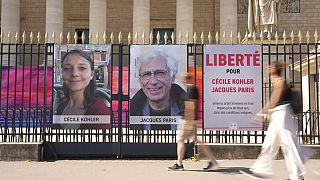Coronavirus
A compromise for a waiver of intellectual property rights on vaccines against Covid has been reached between four major manufacturing players, the WTO says, calling for other member countries to be convinced.
Noting that the details of the compromise are not yet all worked out, World Trade Organization chief Ngozi Okonjo-Iweala on Wednesday highlighted the "decisive progress made" by the European Union, the United States, India and South Africa "on a waiver to the Agreement on Trade-Related Aspects of Intellectual Property Rights for the production of Covid-19 vaccines."
"This is a big step forward," Okonjo-Iweala said.
A few hours earlier, Adam Hodge, spokesman for the U.S. Trade Representative, had announced "a compromise paving the way (...) to a concrete and significant result".
While stressing - as several other observers - that consultations on the text, which has not yet been published, were still underway.
In the United States, the Chamber of Commerce has already expressed its opposition to a waiver of intellectual property rights.
This technical agreement must now be confirmed at the political level, according to the entourage of the French Minister Delegate for Foreign Trade, Franck Riester.
According to the same source, the compromise on the table would only be applicable to developing countries, and only to those representing less than 10% of annual world exports of vaccines against Covid, excluding de facto China.
The compromise does not aim to dismantle the current intellectual property system, but to facilitate the granting of "compulsory licenses", in the face of the Covid pandemic but also for future health crises.
Under the WTO agreements, a compulsory license exists, making it possible for public authorities to use a patent without the authorization of its holder. A system that provides for compensation to the group at its origin.
- "Considerable restrictions" -
Once the compromise has been validated politically, the EU, the United States, India and South Africa will have to convince the other members of the WTO, where decisions are taken by consensus.
Switzerland, which is home to major pharmaceutical companies, has repeatedly expressed its strong reservations about the principle of a waiver of intellectual property rights.
Many developing countries, supported by NGOs and certain international organizations, including the World Health Organization (WHO), are calling for a waiver of intellectual property rights in order to facilitate greater sharing of knowledge and the rapid multiplication of vaccine production sites.
The pharmaceutical lobby, represented by the International Federation of Pharmaceutical Manufacturers & Associations (IFPMA), on the other hand, is fighting against any plans to waive intellectual property rights, arguing that there are enough vaccines being produced worldwide (currently 12 billion doses per year) and that the priority is to speed up distribution.
"Technology transfer goes far beyond patents, it relies on trust, sharing of know-how and voluntary licensing," the organization said Wednesday.
Discussions at the WTO on intellectual property and access to vaccines in poor countries were launched by India and South Africa during 2020.
With no real progress, the same two countries, joined by the US and EU, launched a small group in December to negotiate a compromise.
In a statement, Doctors Without Borders stressed that the compromise contains "considerable restrictions": "it is geographically limited, covers only patents and does not address other intellectual property barriers, such as trade secrets.
"It is extremely worrying that the text (...) currently only covers vaccines, but not treatments or diagnostics," said Dimitri Eynikel of MSF.













01:29
US medication safety agency approves biannual preventive HIV shot
01:02
As cholera cases surge, African leaders urge local production of vaccine
Go to video
England to launch world-first Gonorrhoea vaccination programme
Go to video
WTO and IMF warn of global trade disruptions a new U.S. tariffs
01:30
The ramifications of Trump's tariff decisions for world trade organisation
00:50
$45 million to boost vaccine production in Senegal